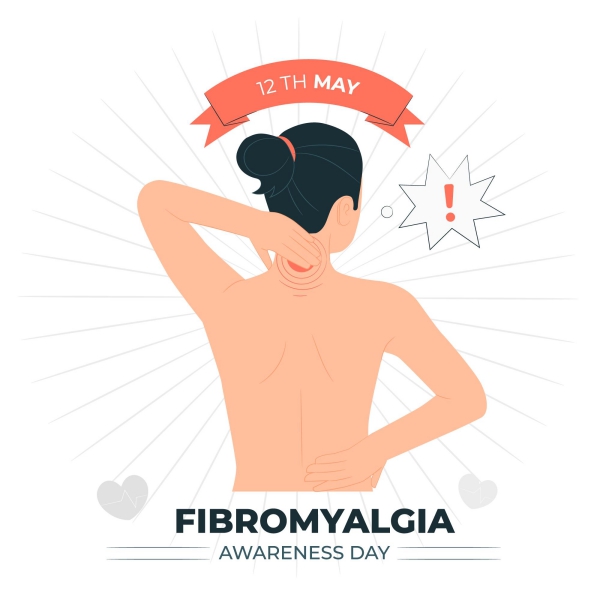What is Fibromyalgia?
Fibromyalgia is a chronic musculoskeletal disorder in which you experience widespread pain in your muscles associated with lack of energy, poor sleep, problems with memorising things and mood issues. The pain is present all over your body especially when certain parts are touched. This medical condition most commonly affects women compared to men. It can arise among both children and adults.
There are many other medical conditions that can accompany fibromyalgia such as depression, anxiety, headaches amongst others.
While being a complicated condition, it is very important to be able to make its diagnosis as it can manifest in the same way as other diseases. Fibromyalgia cannot be cured, but with proper management, a person with the disease can live a normal life as this is not a life threatening condition.
Causes of Fibromyalgia
The exact cause of fibromyalgia is still not known. It has not been proven whether a specific cause can lead to the development of the disease. However, there are certain factors that can trigger or make symptoms worse. These factors include:
- Emotional stress: this can result in some hormonal changes which can make fibromyalgia more likely
- Physical stress
- Certain infections: such as viral infections or Lyme disease
- Emotional trauma: this may be linked to post-traumatic stress disorder
- Physical trauma

Certain theories on the other hand explain that this condition can be due to a problem coming from the brain whereby pain sensations are exaggerated due to some chemical misbalance. It is also believed that some people are at higher risk of having fibromyalgia as they have a genetic predisposition. If you have a close family member with the disease, you may be at higher risk of ending up having it too.
Who are at risk?
Even if there are no specific causes of fibromyalgia, certain factors can make you more prone to have it namely:
- Stress
- Injury
- Infections
- Gender: women are at higher risk
- Age: your risk of having fibromyalgia increases with increasing age
- Family history: you are at higher risk if you have a close family member with the same condition
- Pre-existing medical conditions: having lupus or Rheumatoid arthritis can make you more prone of ending up having fibromyalgia
Signs and symptoms of Fibromyalgia
The most common and cardinal manifestation of fibromyalgia is widespread pain across the body. The pain is usually constant and dull lasting for several months. It most commonly affect certain specific parts of the body such as the head, arms, chest, abdomen, legs, back and spine. Fibromyalgia can also manifest with the following signs and symptoms:

- Fatigue: you may feel tired most of the time despite having slept. You may wake up feeling unrefreshed.
- Headaches
- Depression and anxiety
- Change in bowel movements: diarrhoea or constipation
- Cognitive difficulties: you make find it difficult to concentrate or focus when you need to
- Difficulty sleeping
- Abdominal pain
The presentation of fibromyalgia tends to be more severe among women in contrast to men and menopause might play a role in making it worse. The condition in both men and women can sometimes be so severe that they are no longer able to perform their daily activities normally thus affecting their quality of life, relationships and work.

Making a diagnosis
There is no specific test to diagnose fibromyalgia. However, the signs and symptoms present in this condition can also occur in other medical conditions such as rheumatoid arthritis or lupus amongst others. Your doctor will first take a thorough and detailed history, followed by a proper physical examination. This will help your doctor to think about the list of possible causes for the pain you are having. With that being done, your doctor will then proceed with tests to rule out the other medical conditions. If you have generalised pain for a duration of at least 3 months without any cause found on the tests, you are more likely to have fibromyalgia. The most commonly performed tests include:

- Complete blood count
- Erythrocyte sedimentation rate and C-reactive protein: These are usually raised in inflammatory disorders. Since fibromyalgia is not an inflammatory condition, these will be normal in that case.
- Antinuclear antibody: This is usually elevated in Lupus
- Rheumatoid factor: This is present in people who have rheumatoid arthritis
Treatment of Fibromyalgia
Fibromyalgia is a disease which has no cure. It is a chronic condition which can however be properly managed with an appropriate treatment. There is an array of medications, self-care and lifestyle changes that can help you in improving your quality of life and minimizing your symptoms. However, it is important to note that one treatment will not suit every patient with fibromyalgia. With time, your doctor will figure out what is the most appropriate treatment for you.
Medications
There are several medications that you can take to alleviate your pain and help you sleep better. These include:
- Pain reliever: There are several drugs that can be obtained over-the-counter for pain relief. This include acetaminophen or naproxen sodium. Others are only obtained as pre ion drugs such as tramadol. However, it is not recommended to use narcotics as there is a risk that you become dependent on the drug.
- Antidepressants: Fibromyalgia can have a huge impact on your mood, therefore, your doctor may recommend you to take antidepressants such as duloxetine which will both help in pain management and mood. Furthermore, amitriptyline can be prescribed to help you sleep better.
- Anti-seizure drugs: Some anti-seizure drugs have proved to be effective in the pain management of fibromyalgia. These medications work on certain areas of your brain that deal with pain. Examples of anti-seizure drugs used are gabapentin and pregabalin.

Therapy
Besides the use of medications, a combination of therapies can also be helpful in alleviating the burden of fibromyalgia. These are:
- Physical therapy: It will help you a lot if you learn some exercises which will increase your strength and flexibility.
- Occupational therapy: This will help you bring about some changes to your living or working space which will enable you to perform your required tasks easier.
- Relaxation therapies: Will help you reduce your stress levels and teach you helpful ways to deal with stressful situations.
Lifestyle modifications
Certain lifestyle modifications can be very beneficial in managing fibromyalgia symptoms. These measures include:
- Reducing stress using relaxation techniques or limiting overexertion. Give yourself some time to relax and plan ahead.
- Getting sufficient sleep as fibromyalgia can make you feel tired all the time. Adopt some good sleep habits such as going to bed early and avoiding daytime naps.
- Exercising regularly is really important as being active can improve your symptoms. Initially, being active can make you feel more pain, but in the long run it will actually alleviate your symptoms. Start slowly and gradually make your way up. Some recommended exercises include walking, cycling or swimming.
- Maintaining an overall healthy lifestyle by eating healthy, drinking a lot of water and limiting your caffeine intake will also add benefits to your management.

Complications of Fibromyalgia
The most common complication of fibromyalgia is due to the lack of sleep and constant feeling of fatigue. This may end up affecting your personal life and your capacity to function properly in both your home and work. This can further cause you to be frustrated further resulting in depression and anxiety.
Prognosis of Fibromyalgia
The symptoms of fibromyalgia can severely impair your daily living. It can also be hard for other people to see this condition as a real disease since the symptoms cannot be seen. However, it is really important for you to take this seriously and adhere to the treatment given by your doctor. It is also primordial for you to bring about the necessary lifestyle modifications along with taking care of yourself. Don’t be too harsh on yourself. Your state of mind greatly affects how you feel. Do your best to keep a positive attitude and learn how to cope with your condition.

Source:
J. Alastair, I. and Simon, M., 2016. Davidson’s Essentials of Medicine. 2nd ed. London: ELSEVIER.
Parveen, K. and Michael, C., 2017. Kumar & Clarks Clinical Medicine. 9th ed. The Netherlands: ELSEVIER.
Boomershine, C., 2019. Fibromyalgia.









